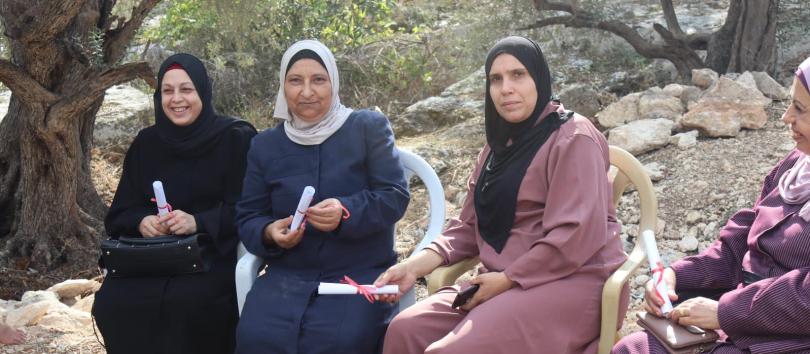
Adult education: a route to inclusion and prosperity
Learning is a lifelong process yet in many countries access to education is very limited as soon as formal education is completed. Adult education can provide unique opportunities to gain new knowledge, skills and confidence to help make positive and life-changing decisions. The Al-Yamoun Community Centre in Jenin, Palestine* and the Adult Education Centre in Zarqa, Jordan, are just two examples of how local development projects, supported by organisations such as the European Training Foundation (ETF), can empower individuals of all ages and positively impact their communities.
The Southern and Eastern Mediterranean region is an area with widespread unemployment affecting both young people and adults. Low educational attainment, skills mismatch with labour market requirements, gender and age, as well as inactivity due to family care responsibilities, especially among younger women, are some of the main reasons why significant numbers of working-age adults are excluded from the workforce and community. For unemployed people, the training provided through active labour market measures is often not sufficient in either quantity or quality to be helpful in getting them back to work. Florian Kadletz, ETF Human Capital Development Expert explains the challenges.
'Exclusion from work, being under-utilised and not having the opportunity to contribute to society has a huge negative impact on an individual’s mental health and wellbeing, as well as causing very significant financial problems for their families. As a consequence, communities suffer, as areas of high unemployment rates are more likely to have limited employment opportunities, low-quality housing, limited access to public services and underfunded schools. It is a very vicious circle.'
This is why innovative educational projects, such as those initiated and led by DVV International and supported by the ETF, play such an important role in increasing community engagement and employability. Jolien van Uden, ETF Innovative Teaching and Learning Expert, explains ETF’s role in more detail.
'The ETF, as experts working at a system and policy level with partners and stakeholders in the EU’s neighbouring regions, was able to collaborate with DVV International on this pilot project to provide research, and help develop the outreach strategy for the programmes.'
Kadletz continues:
'By implementing these programmes at local community centres, they can reach those individuals most in need. The trainers help them regain trust and self-belief, and demonstrate that through learning and re-skilling they can open up new work and life opportunities and really change their lives.'
It is, indeed, a very effective approach based on trust and shared experiences, all set in a local and familiar context. Both the adult education centres in Zarqa and Jenin use local people as trainers and mentors, which helps participants to feel comfortable as they start on their learning journey. For many, this will be their first experience of adult education. 'Contextualising the programmes is a key factor to maximising the active participation of learners,' says Kadletz. In Jenin, the programme is structured around the concept of Mujawara, an educational approach which roughly translates as 'Neighbourhood of Hope' and is based on trust, honesty and mutual respect. In Zarqa, the programme follows a framework based on Tafakur, a process of contemplation and reflection. Van Uden continues:
'In both projects, the objectives were clear: to provide a programme that allows learners to reflect on their experiences, explore their strengths and abilities, and gain a confidence that they may have lost as a result of hardship, misfortune or a lack of opportunity.'
The initial part of both programmes focuses on personal development, discussing and assessing social and emotional skills, and enhancing awareness and understanding of each individual’s strengths and abilities. Over varying time periods at each centre, the participants are introduced to, and guided through, a range of competences including communication skills, planning and goal-setting skills. With continual support from the trainers and mentors, the participants are then encouraged to pursue a learning path focused on vocational courses such as cookery, beekeeping or sewing, or social activities designed to address specific projects and needs within the local community. Opportunities to reflect on their achievements are provided by the final Mujawara at the centre in Jenin, where learners leave with their own road map, and a final Tafakur at the centre in Zarqa, where participants reflect and look ahead to their objectives for the future.
Feedback on the innovative training programmes has been overwhelmingly positive from all involved, including trainers, learners, organisers and the community as a whole. One participant in Jenin highlighted the positive impact of the course in helping them to feel included and valued in their community.
'Thanks to this course, I am working in my own business, which makes me feel […] an active individual in society. This training exceeded my highest expectations. Furthermore, I made a lot of friends in this centre. I feel like I have a new family.'
Kadletz underscores the importance of adult education programmes such as those at Jenin and Zarqa in creating a turning point for individuals and their communities.
'The unique, dialogue-based, reflective methodology of both programmes responds directly to the initial needs of learners, building their skills and confidence in their own abilities. The continuous support structure of both the centres and the calibre of the training staff means that the learners are actively engaged with the educational programme and feel empowered to put their own ideas and their newly acquired skills into action.'
Van Uden concludes:
'Collaborative projects such as these really are a win-win. We look forward to sharing these re-skilling educational programmes as examples of best practice, and helping to integrate the learning approach into wider active labour market measures.'
* This designation shall not be construed as recognition of a State of Palestine and is without prejudice to the individual position of the Member States on this issue.
Did you like this article? If you would like to be notified when new content like this is published, subscribe to receive our email alerts.